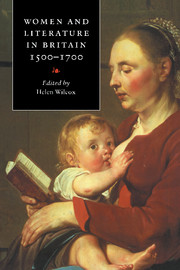Book contents
- Frontmatter
- Contents
- List of contributors
- Acknowledgements
- A note on references
- Chronology: women and literature in Britain, 1500–1700
- Introduction
- Part I CONSTRUCTING WOMEN IN EARLY MODERN BRITAIN
- Chapter 1 Humanist education and the Renaissance concept of woman
- Chapter 2 Religion and the construction of femininity
- Chapter 3 Advice for women from mothers and patriarchs
- Chapter 4 Women reading, reading women
- Chapter 5 Women/‘women’ and the stage
- Chapter 6 Feminine modes of knowing and scientific enquiry: Margaret Cavendish's poetry as case study
- Part II WRITING WOMEN IN EARLY MODERN BRITAIN
- Further reading
- Index
Chapter 1 - Humanist education and the Renaissance concept of woman
Published online by Cambridge University Press: 22 September 2009
- Frontmatter
- Contents
- List of contributors
- Acknowledgements
- A note on references
- Chronology: women and literature in Britain, 1500–1700
- Introduction
- Part I CONSTRUCTING WOMEN IN EARLY MODERN BRITAIN
- Chapter 1 Humanist education and the Renaissance concept of woman
- Chapter 2 Religion and the construction of femininity
- Chapter 3 Advice for women from mothers and patriarchs
- Chapter 4 Women reading, reading women
- Chapter 5 Women/‘women’ and the stage
- Chapter 6 Feminine modes of knowing and scientific enquiry: Margaret Cavendish's poetry as case study
- Part II WRITING WOMEN IN EARLY MODERN BRITAIN
- Further reading
- Index
Summary
Women, or ‘woman’ to use language more familiar to sixteenth and seventeenth century authors, composed a group that early modern writers felt obliged both to define and to advise. Women existed more clearly as a category in the minds of Renaissance authors than as disparate individuals. This chapter will focus on understanding what the category ‘woman’ meant during the Renaissance, and what values and social realities placed women there. What qualities most defined them? What realities clearly constrained them? Which social classes mattered (and which did not) in developing this concept of woman? Such questions emerge from issues embedded within ‘woman’ as Renaissance concept, and they aid us in understanding major early modern texts which treat women.
Sixteenth-century humanism, whose authors produced the most important Renaissance works on women, was an educational and philosophical movement that criticised the limited academic universe of late medieval scholasticism. Humanism, originating in fourteenth-century Italy, spread throughout the educated classes of early sixteenth-century England and continued its influence into the seventeenth as well. This chapter will focus on the broad outlines of Renaissance humanism, its treatment of women, and its growth and ultimate decline. Sixteenth-century humanism, as exemplified in the works of Thomas More, Thomas Elyot and Juan Luis Vives, offered an educational and linguistic programme for those who wished to pursue the ‘New Learning’.
- Type
- Chapter
- Information
- Women and Literature in Britain, 1500–1700 , pp. 9 - 29Publisher: Cambridge University PressPrint publication year: 1996
- 2
- Cited by

